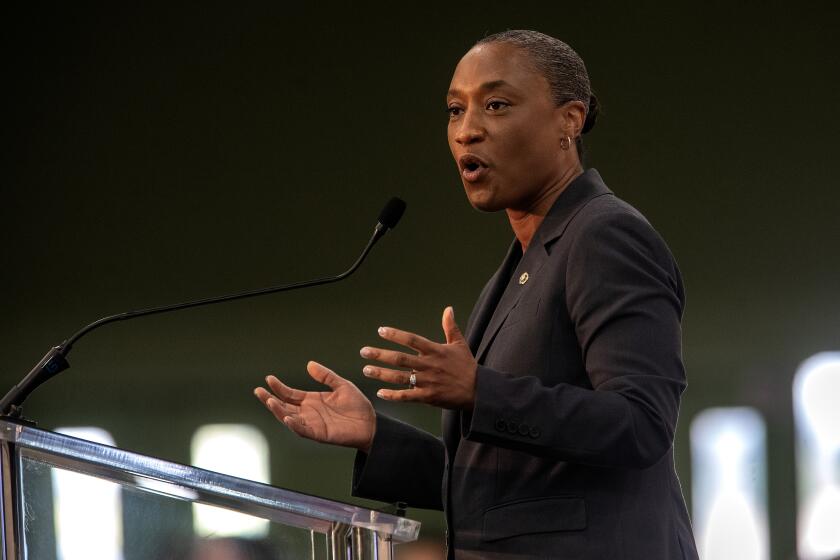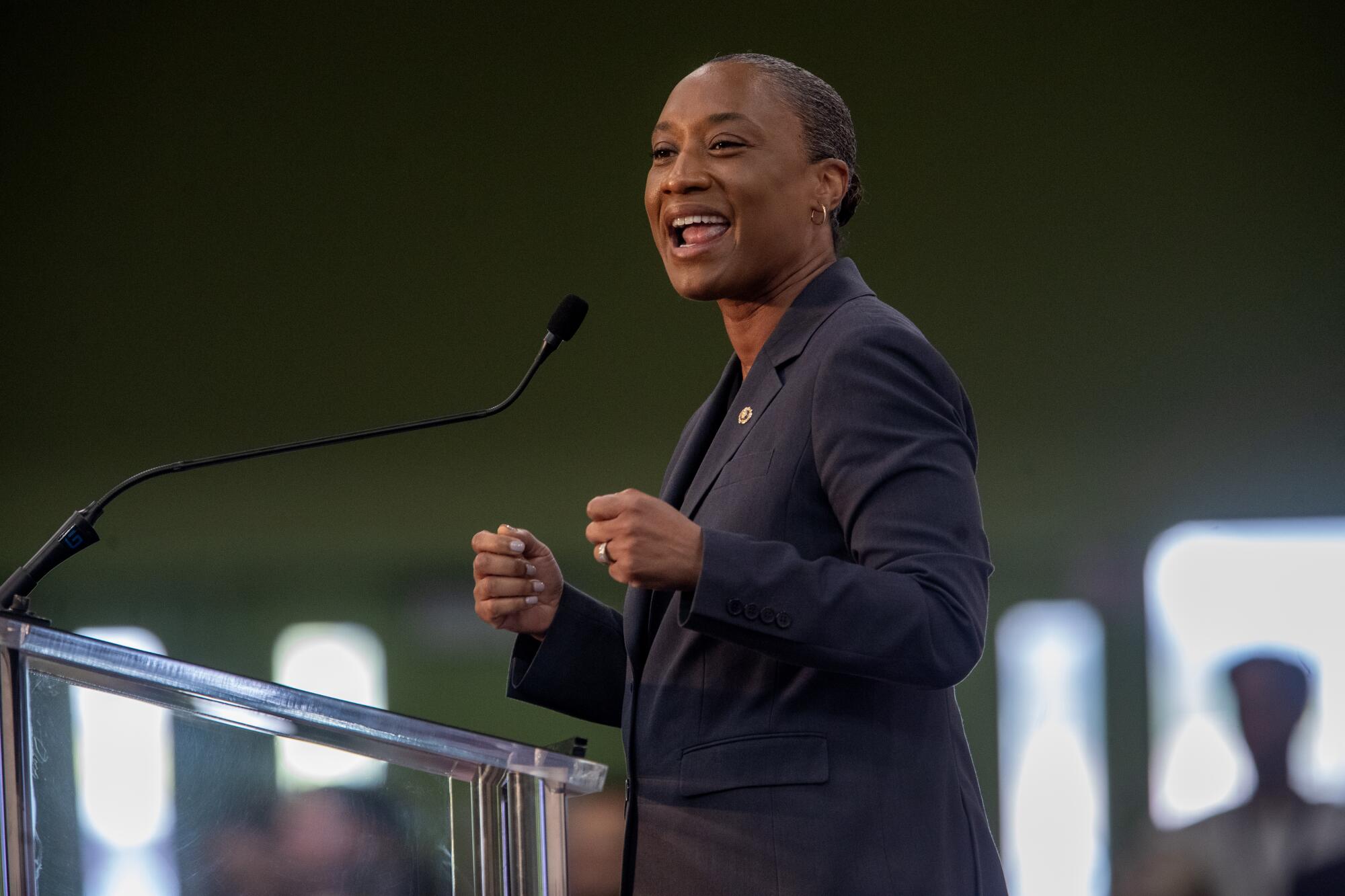
- Share via
WASHINGTON — As then-Sen. Kamala Harris’ presidential bid was collapsing in late 2019 amid factional infighting, her campaign badly needed a trusted person who could close the operation down — pay off bills, terminate contracts and counsel staff members who needed jobs.
Internal backbiting and lackluster support from voters had undone a two-year effort, and Harris, once seen as a top-tier contender, was now bowing out a full two months before the Iowa caucuses, the first contest of the Democratic primary season.
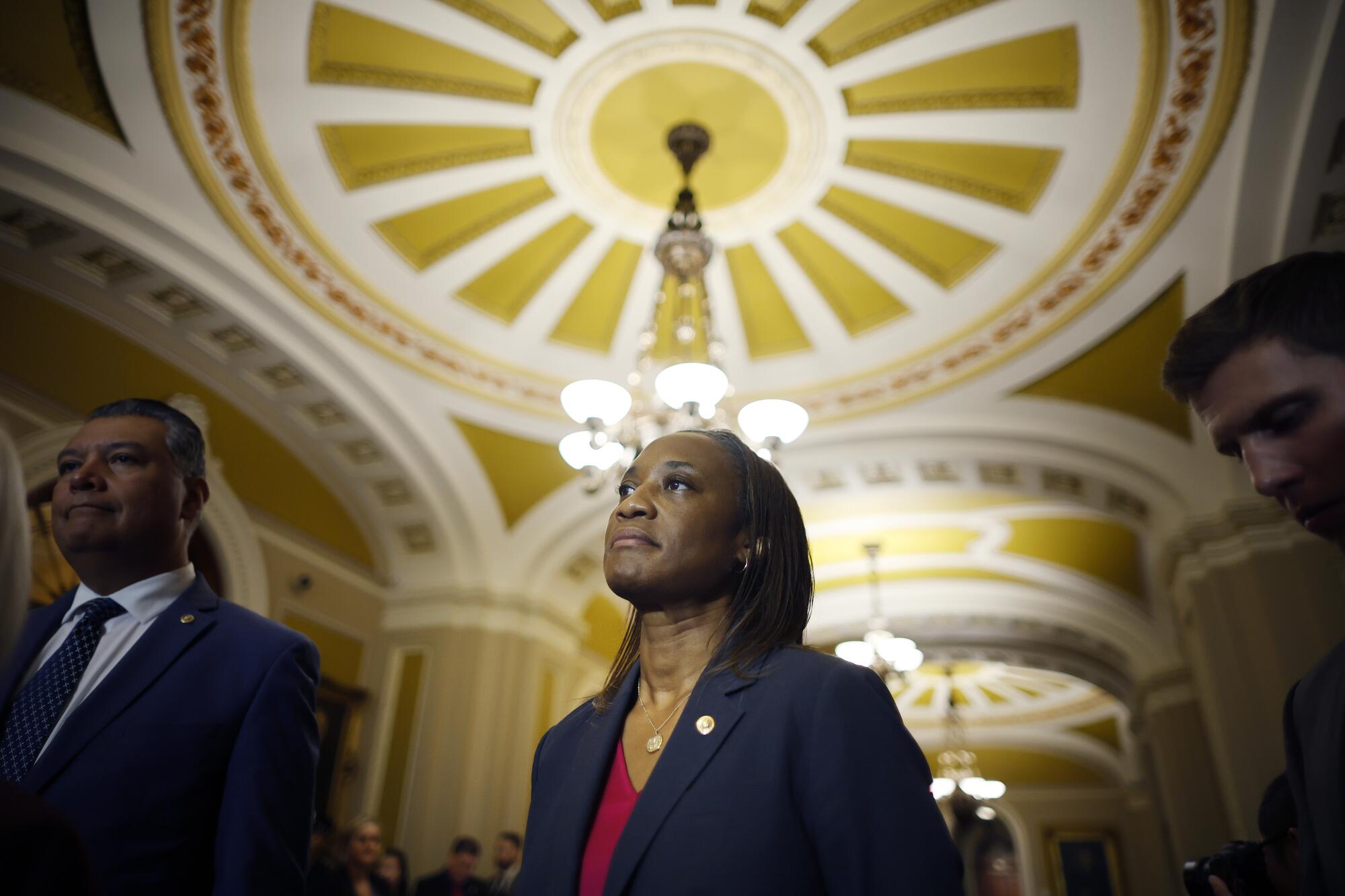
At that moment, one of the lowest in her political career, Harris turned for help to someone she had worked with for nearly a decade — Laphonza Butler.
“Everyone else was gone,” said Nathan Barankin, a senior campaign advisor. “She was the person trusted by all sides.”
The newly appointed senator says she is experiencing mild symptoms and will work remotely while she recovers.
The role was the sort of behind-the-scenes job at which Butler has excelled during her rapid rise in Democratic politics in California. Arriving in the state in 2009, Butler moved up through the ranks of its powerful labor unions, along with later stints in corporate lobbying and national politics. She wielded her clout quietly, forging connections with politicians and mentors whom she impressed, including Harris and Gov. Gavin Newsom.
“She is an individual who doesn’t pound her chest,” said Wendy Greuel, a former Los Angeles city controller who serves on the board of Emily’s List, a Democratic group that helps fund political campaigns by women who support abortion rights — a group that Butler led from 2021 until a few weeks ago.
An unexpected call from the governor’s office on Sept. 30 suddenly changed Butler’s role. No longer a behind-the-scenes operative, she’s now a front-facing principal, serving the final 15 months of the late Sen. Dianne Feinstein’s term, and potentially — she has not yet announced a decision — a candidate to keep the job.
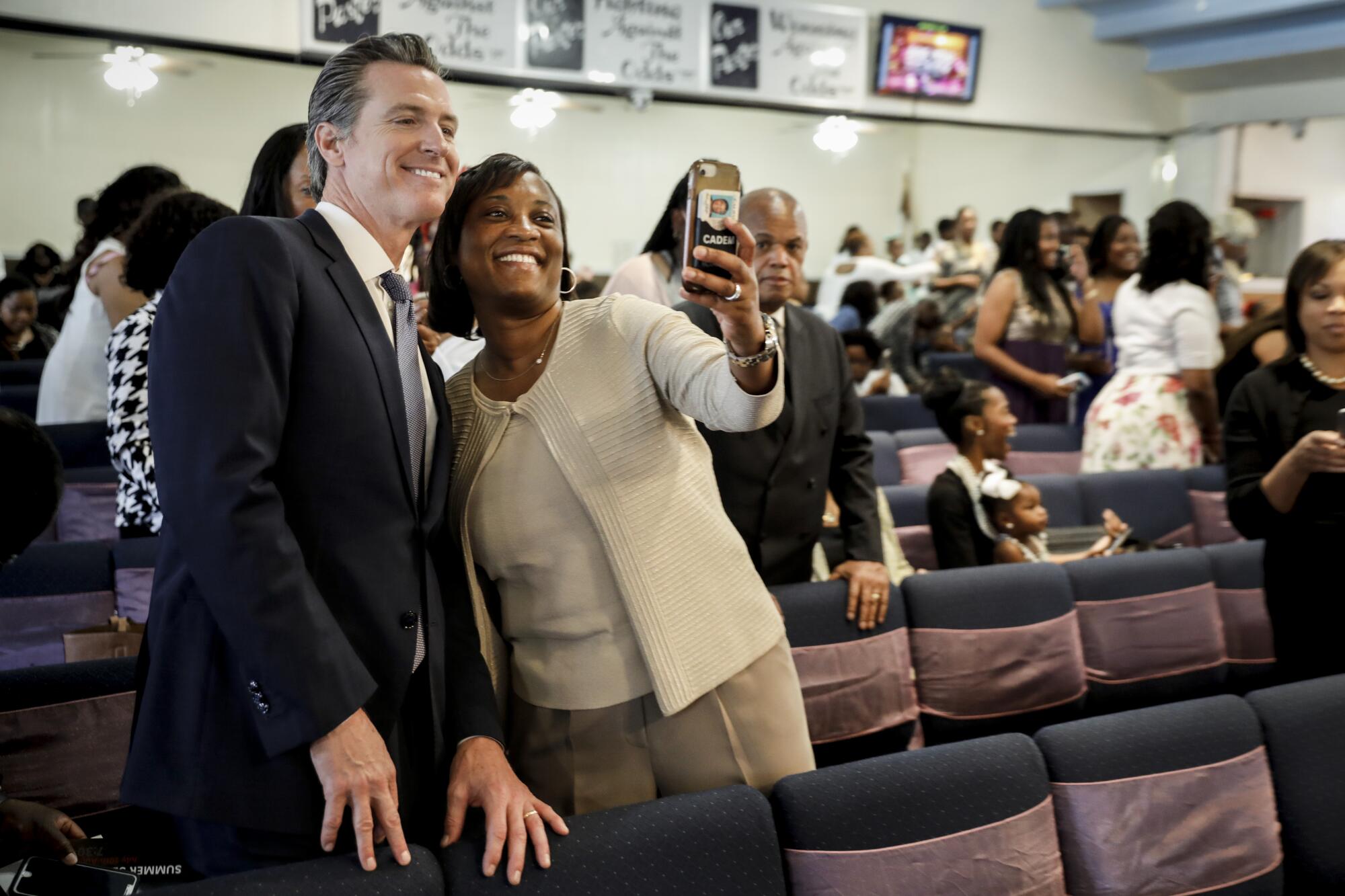
Harris, who rose from the wreckage of her presidential run to become vice president, swore Butler in on the Senate floor earlier this month.
Butler and Harris met during the 2010 election, when Harris, then the San Francisco district attorney, faced six Democrats in a contested primary for state attorney general. Harris had struggled to stand out in the field and was eager to make inroads in Los Angeles, where she was virtually unknown.
Butler, just 31, had spent less than two years in Los Angeles. But she had already established herself as a significant political figure.
The Service Employees International Union had recently installed her as the head of a major local based in Los Angeles, replacing Tyrone Freeman, who had stepped down after a series of articles in The Times documented allegations of stealing from the low-income workers he represented. He would subsequently be convicted on 14 counts of embezzlement, fraud and tax violations.
Butler said in an interview that she had sought out the L.A. job after seven years of working as an organizer and staff member for SEIU based in Baltimore and Washington, because she wanted to help the women of color who dominated the local.
“They reminded me of my mom,” who worked as an unarmed security officer, with low pay and no benefits, and in a nursing home on the overnight shift, she said.
“And you know, she was dog-tired when she came home, but she always wanted to make sure that she was home in time enough to walk me and my two brothers to the crossing guard to go to school,” Butler said. “And so I saw in these women and this opportunity a chance to offer what my mother never had the opportunity for.”
Butler was raised in Magnolia, Miss., where her mother struggled to take care of her father, who had heart problems and died when Butler was 16. She attended Jackson State University, a historically Black public school just over an hour away from her home, graduating in 2001 with a degree in political science. Soon after, she took a job with SEIU, working at a salary of just under $30,000 organizing hospital and healthcare workers.
Over the next several years, she worked her way up through the union’s ranks. In 2007, she took a senior position in one of the union’s major divisions, the one that represented janitorial workers.
Along the way, she attracted the attention of a powerful mentor, Andy Stern, the president of the 1.9-million-member union.
Stern was initially skeptical when the young organizer, just a few years out of college, asked him to meet.
“Part of me was like, why does she want to have dinner with me?” he recalled. “Is it a hustle?”
She quickly won him over during near-monthly dinners in Washington that also included Anna Berger, Stern’s second-in-command at SEIU, and Neneki Lee — another young staffer who eventually became Butler’s wife. The couple have a daughter, Nylah, now 9.
Butler, Stern said in an interview, asked incisive questions about how union leaders decided on political endorsements, what qualities Stern looked for in an organizer and whether people who want to advance their careers should seek a high-ranking job at headquarters or branch out to run a union local.
“Laphonza has a very straightforward, no-nonsense approach to things. It’s not hard to figure out what she’s thinking,” he said. “That was very helpful to me — most people were trying to cultivate favors and say what they thought I wanted to hear.”
“She decided that my engagement with her — my mentorship — was really helpful for her to learn,” Stern recalled. “And it couldn’t hurt to know the president of the union.”
Butler decided she wanted to run a local, and in 2008, she asked Stern whether he would send her to Los Angeles.
Stern said no. After the scandal surrounding Freeman, Stern said the union “needed someone to clean house and get to the bottom of things,” and deal “with all the residue of a disaster” — a job that would see its fair share of acrimony and recriminations.
But when the time came to restore the union, he called Butler in.
“There was a lot to overcome. There was a big hangover of negativity because of Tyrone’s behavior,” he said. “She took it over, rebuilt it, and rebuilt our standing with the community.”
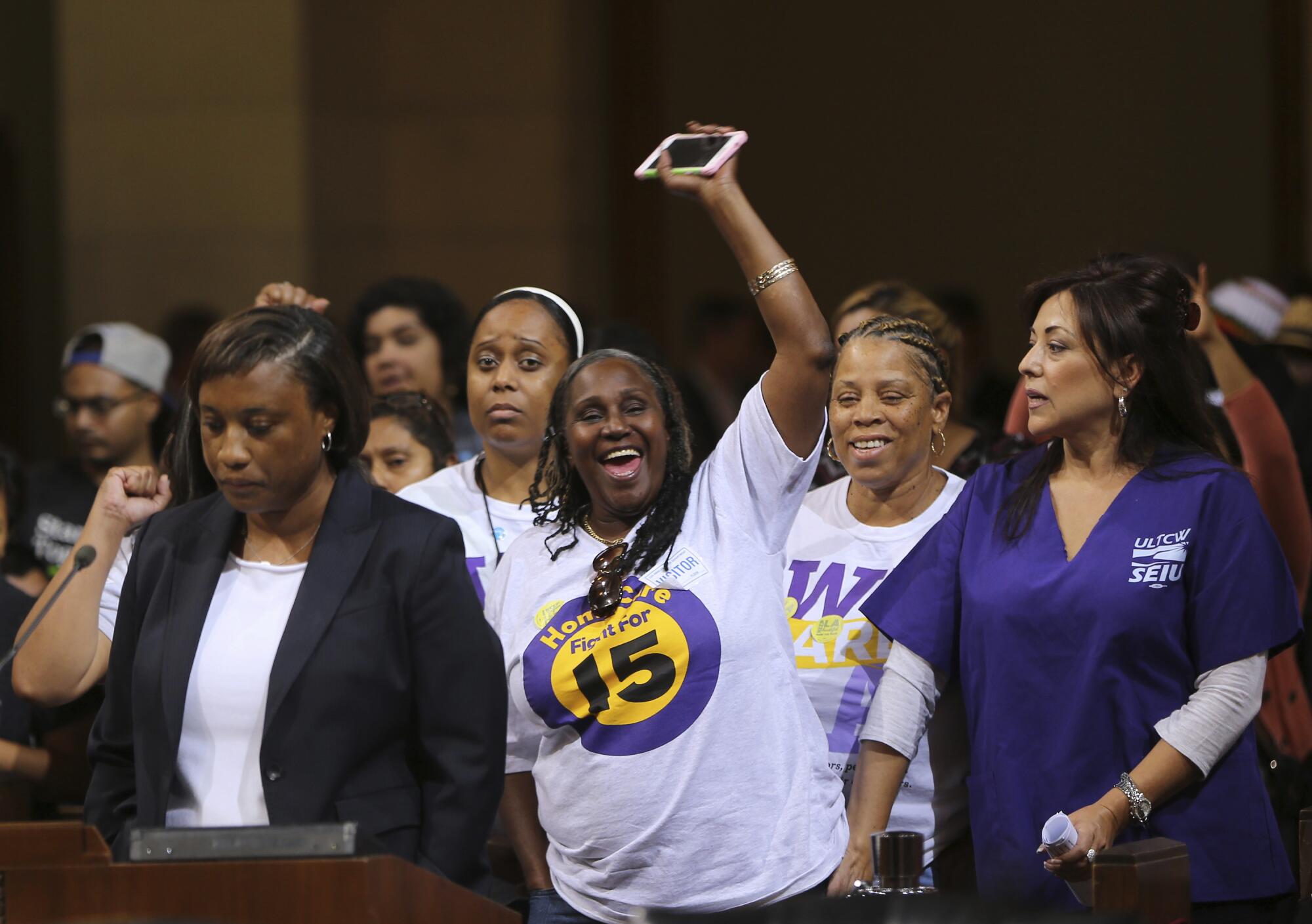
Butler forged bonds across L.A.’s civic structure, developing close ties with Greuel, then the city controller; Holly Mitchell, then a state legislator and now an L.A. County supervisor; and Mark Ridley-Thomas, the veteran lawmaker who was then a county supervisor.
The bond with Ridley-Thomas has endured. This year, after a jury convicted him of bribery, conspiracy and fraud in a federal public corruption case, Butler was among more than 130 people who wrote letters to the judge before his sentencing. Ridley-Thomas’ help in rebuilding the union “meant the world to the members,” she wrote.
Butler met Harris at a labor event.
The two women clicked.
They shared the challenges of being Black and female in a political world dominated by white men. Both had also gone to historically Black colleges — Harris to Howard University and Butler to Jackson State. Butler’s father had urged her to become a lawyer when she was younger, and she saw union work as another path to social justice. Harris often spoke of her legal work in similar terms.
Harris asked her top consultant, Ace Smith, to reach out to Butler for help in her primary campaign for state attorney general.
“I thought it would be one of these things where I need to do a lot of persuasion,” Smith recalled. “Instead, she was all in, ready to go, literally ready to turn tables over for us — the support you always hope to get in a campaign that you rarely get.”
The alliance helped Harris overcome the advantage of labor ties held by Democratic state legislators who were among her chief opponents. It cemented a level of trust.
“It’s easy to jump on the bandwagon,” said Sean Clegg, Smith’s partner. “You always remember the people and value the relationships with people who were there when it was a twinkle in the eye.”
Butler remained in Harris’ inner circle of advisors and provided political backing of another sort in 2011, when Harris, then California’s attorney general, walked away from a national settlement with banks that had foreclosed on millions of Americans during the mortgage crisis. Harris had been under pressure from the Obama administration to accept the settlement.
“There weren’t a whole lot of people that said ‘Yeah, Kamala, you go,’” recalled Barankin, who was then Harris’ chief of staff. “Most people were like, ‘Do you know what you’re doing?’”
“Laphonza was one of a small group of important people out there who supported Kamala 100% on that,” he said.
Harris ended up securing a much bigger payment for Californians — $20 billion — which became a central talking point in her presidential campaign.
Butler continued her rise in the labor movement. In 2015, the SEIU consolidated several union locals into a new, statewide unit representing more than 325,000 long-term care workers. Butler was appointed president of the new local, making her one of the state’s most influential labor leaders.
She was a frequent presence in Sacramento, where she played a major role in increasing the state’s minimum wage.
Her salary climbed, too: In 2018, her final year with the SEIU, she earned $243,249, just $13,000 less than Mary Kay Henry, who had succeeded Stern as the union’s president, according to union filings with the Labor Department.
By the time Harris launched her presidential campaign in early 2019, Butler had joined Smith’s political firm, now known as Bearstar Strategies, and became a senior advisor to Harris.
On the campaign, Butler spent the bulk of her time courting and tending to college groups, volunteers and high-level endorsers in early primary states, said Jalisa Washington-Price, South Carolina state director and deputy national political director for Harris’ campaign.
In her role, Butler often served as a surrogate speaker at events, and when Harris traveled she was usually by her side on the plane.
The hybrid position fused Butler’s ability to relate to people as “a girl from Mississippi” with her experience in brokering internal debates over where to divert limited money, staff and other resources, Washington-Price said.
As the campaign faltered, Harris’ sister, Maya Harris, and campaign manager Juan Rodriguez began to quarrel over strategy and control. Butler managed to stay out of the fray, though “everybody came out of that with a bunch of scars,” according to one former Harris advisor.
The job with Smith’s firm has proved controversial for another reason. While there, Butler advised the ride-hailing company Uber on its dealings with organized labor during a contentious time in which lawmakers were deciding whether drivers and other gig workers should be treated as employees with minimum wage and overtime protections.
The stakes were large. For Uber alone, making drivers employees could cost as much as $500 million per year, according to a study by equity research analysts at Barclays.
Uber, Lyft and others desperately attempted to cut a deal with labor unions as Assembly Bill 5 moved through the California Legislature. Officials from the SEIU and the Teamsters met with ride-sharing company executives behind closed doors to try to hash out a pact that would provide some labor protections for drivers but avoid making them employees.
Those negotiations angered advocates for the drivers, some of whom remain incensed at Butler for her part in them.
“There were no drivers in the room as our rights were being negotiated away, and drivers were very mad,” said Nicole Moore, president of Rideshare Drivers United and herself a driver. “It was very disturbing. These are the people who are supposed to defend worker rights.”
“Laphonza has her own path that started solidly in labor and then switched sides to one of the worst labor violators in the world,” Moore said. “You can’t do that. I mean, what are your principles then?”
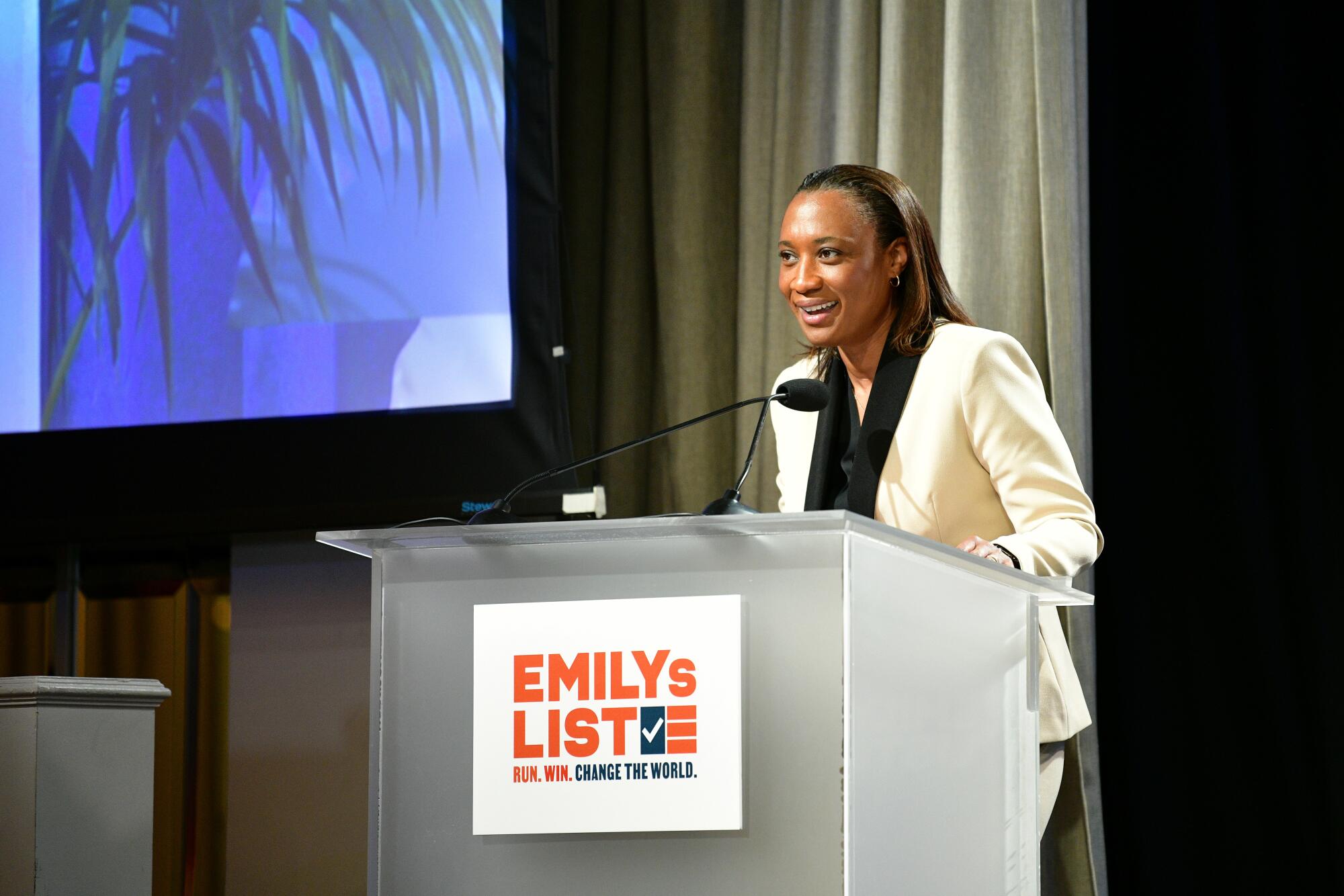
A year later, Butler took a job with Airbnb, a company that has been seen as a threat by hotel union workers. When she left the company the following year to take the job heading Emily’s List, she cashed out stock worth at least $1 million, according to government filings.
“When I decided to join Airbnb, I knew there would be judgment from the labor movement about me going into a corporate environment,” Butler wrote in a passage for a 2022 book called “Take a Lesson: Black Achievers on How They Made It and What They Learned Along the Way.”
The move was a conscious choice to avoid losing out on opportunities and to “pursue this role from a place of curiosity,” she wrote.
“I think about my journey as one of empowering others, and I saw Airbnb as just another expression of that,” she wrote, citing the high number of women renting out their homes and the need to rebuild wealth for Black and brown families who lost homes during the Great Recession.
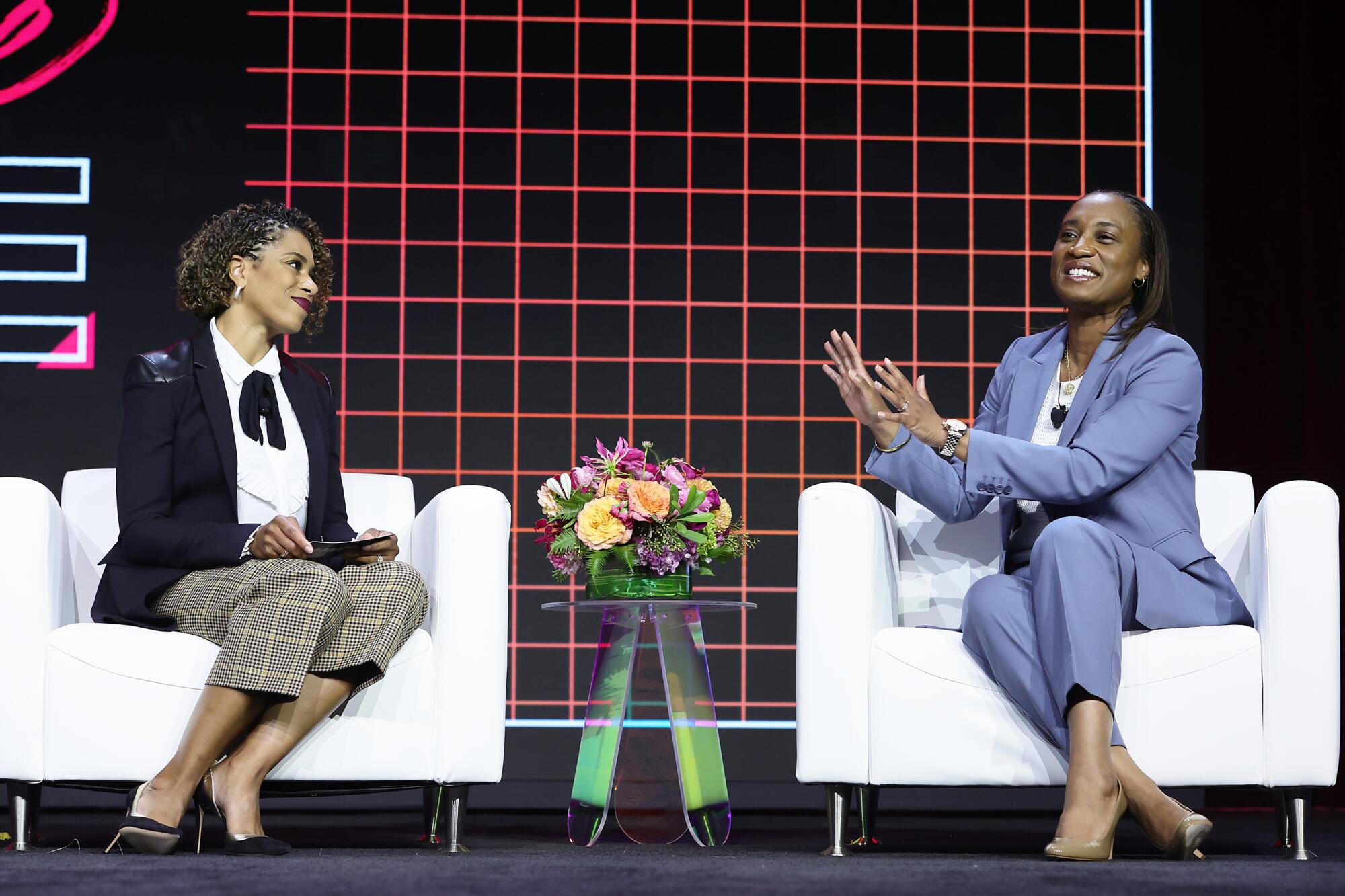
Some in the union movement say Butler has nothing to apologize for.
“We should all focus on her years in the trenches with workers,” said Tia Orr, the current state SEIU director, who worked closely with Butler. “And the life-changing victories she championed to lift up the most marginalized workers in the country — not a short stint on her resume.”
Butler’s move in 2021 to head Emily’s List, one of the most influential groups in Democratic politics, returned her to the electoral arena. It also allowed her to spend more time in Washington and more closely align her day job with her informal role in Harris’ cadre of outside advisors.
The advisory group spoke regularly with Harris and her staff about strategy and messaging, who should be invited to events and where the vice president should travel. Butler became a regular guest at Harris’ Sunday dinners.
She was also part of a group of close supporters who would get regular emails on Harris’ public appearances and news releases so they could amplify Harris’ message and improve her reputation, said Jamal Simmons, Harris’ former communications director.
“The [vice president] often wanted us to check in with her,” Simmons said. “She was one of the people that I talked to fairly regularly.”
The two women’s political priorities were brought more directly into alignment after the U.S. Supreme Court overturned the right to abortion last year. Harris had been scheduled to speak at an Emily’s List fundraising gala the day the decision was leaked. She delivered a fiery rebuke of the court, launching herself into the role of the Biden administration’s main player in the effort to campaign on the issue in 2022 and 2024.
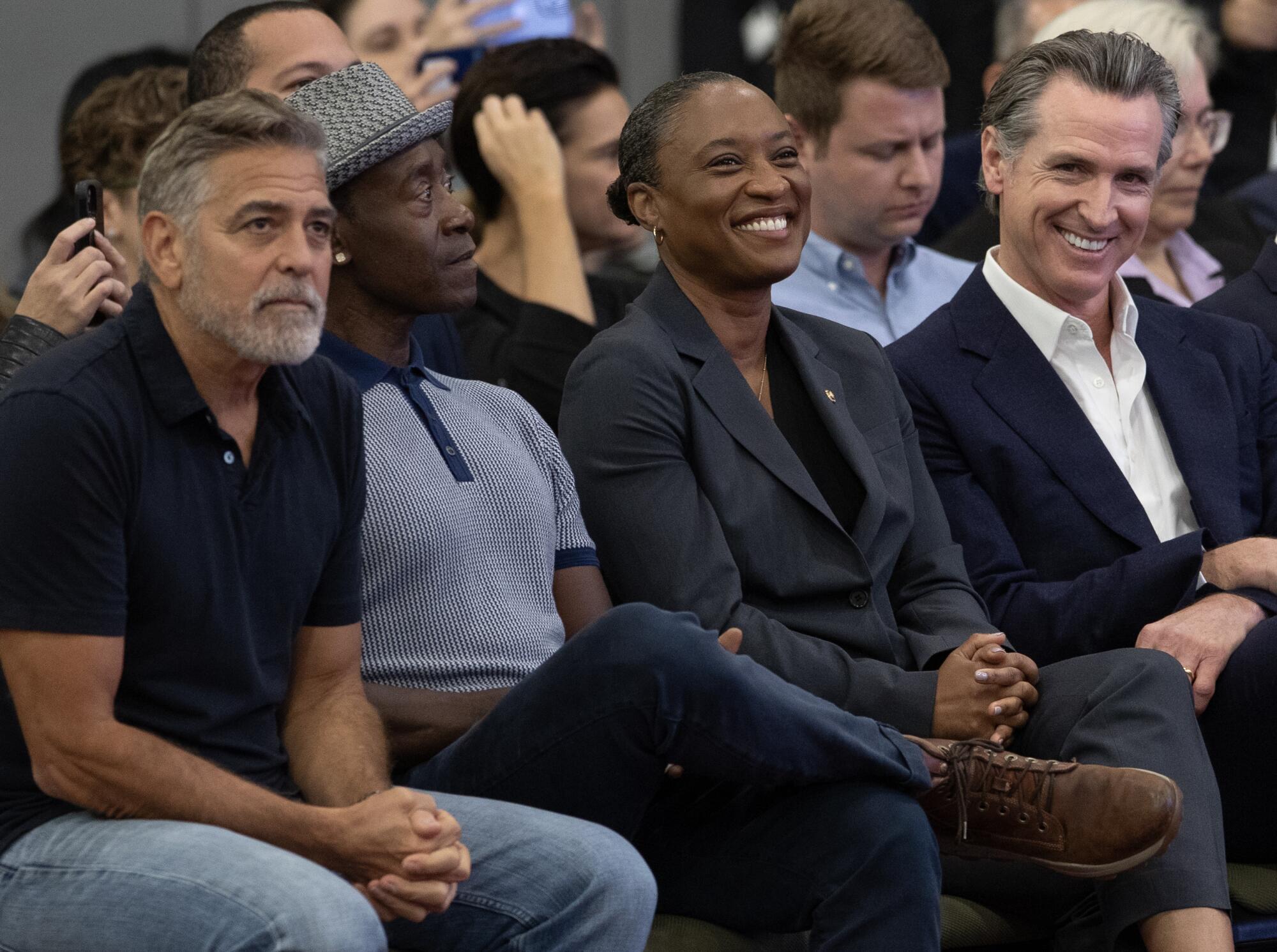
In June, Emily’s List told Politico it would spend tens of millions of dollars promoting Harris, whose approval ratings among Republicans and Democrats have sagged below President Biden’s.
But Butler will no longer be leading that effort to boost her ally. Instead, the political future she’ll be tending will now be her own.
Hamilton and Mehta reported from Los Angeles and Luna from Sacramento. Times staff writers Courtney Subramanian in Washington and Nathan Fenno, Melody Gutierrez and Benjamin Oreskes in Los Angeles contributed to this report.
More to Read
Get the L.A. Times Politics newsletter
Deeply reported insights into legislation, politics and policy from Sacramento, Washington and beyond. In your inbox twice per week.
You may occasionally receive promotional content from the Los Angeles Times.
